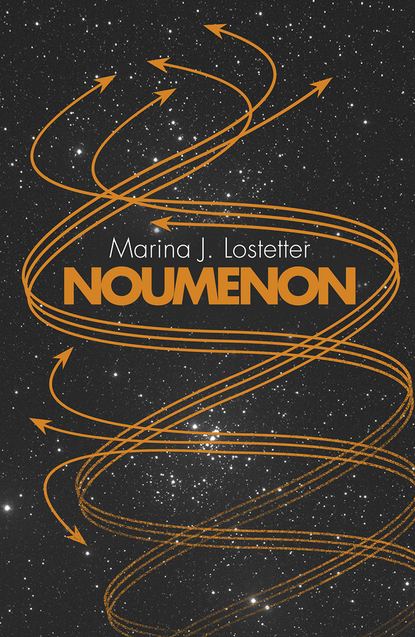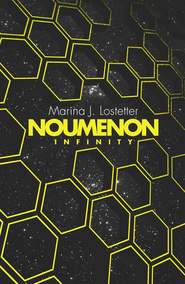По всем вопросам обращайтесь на: info@litportal.ru
(©) 2003-2024.
✖
Noumenon
Настройки чтения
Размер шрифта
Высота строк
Поля
“C is a good name,” C agreed.
Jamal smiled again, clearly tickled. “My colleagues—blinkered sometimes, the lot of ’em—keep asking why I continue to create patches for the Cs now that AI personalities have fallen out of style, but I knew someone out there must enjoy them as much as I do. I used to patch Gs and Ks, but no one was downloading them. C is the only one still hanging on. Can I tell you a secret, C? You were always my favorite anyway. I still use C on my tablet.”
“Thank you, sir,” it said, sounding genuinely flattered.
Jamal showed Reggie to his tiny electric car. The project had taken Reggie all over the place, and he’d learned to travel light, so cramming his baggage into the two-door wasn’t much of a hassle. They drove to Reggie’s hotel with the windows down. Rain had soaked the city a few hours before, and everything smelled damp and renewed.
“You have an interesting accent,” Reggie noted during the ride.
“Algerian,” Jamal explained. “Lived there until I was ten. It’s my mother’s home country.” He explained that she’d come to the UK for university, where she’d met his father. After graduation they married and went to Africa to teach. They lived there for fifteen years until Jamal’s paternal grandparents had fallen ill and the family had relocated to London. “I’m a man of two nations.”
After dropping off Reggie’s luggage, they went to Jamal’s firm for a tour. “I thought you’d be knackered after your flight,” Jamal said when they reached his workspace. Four monitors sat in a semicircle on the desk, each covered with a series of Post-it notes and conversion charts and reminder stickers. “Was going to spiff up the place tomorrow morning.”
“I’m too wired. And C probably couldn’t wait,” he said with a small laugh. “Besides, it’s fine. My workspace is ten times worse.”
The computer engineering firm took up the forty-third floor in a glass high-rise within six blocks of the famous Gherkin. They had a hardware subgroup and a software subgroup, and Reggie had done enough research on Mr. Kaeden to know he did a lot of crossover work. He was the best AI specialist in the world, as far as Reggie was concerned.
Which meant the mission needed him.
They strolled over to the long bank of windows and Jamal showed off the view. He pointed out several of the visible London highlights. “So, why are you here, Dr. Straifer?” he asked when they’d finished with the cursory pleasantries. “None of the other project leaders have wanted to visit the firm, let alone asked to have a chin wag with me specifically. It’s the ship engineers who’re most interested in the computer systems.”
“My lead engineer—Dr. Akane Nakamura, you might have heard of her—told me that none of the convoys are set to use intelligent personal assistants in their user interfaces.”
Jamal shrugged. “Because most people think they’re duff. Irritating window dressing. Sorry, C.”
“What is ‘irritating window dressing’?” C asked. Both men ignored it.
“Well I don’t think it’s, uh, duff. And I want my project to have one,” Reggie insisted. “Actually, I want it to have C.”
Jamal sat quiet for a moment. He seemed pleased, but concerned. “That’s smashing,” he eventually said. “But it won’t be easy to sort. C’s line isn’t set up for personalization on the order we’re talking about—no PA has ever had to tailor itself to so many users. I couldn’t, for instance, just copy your version of C and upload it into the system. I’d have to start from scratch.”
“But could you make it like C, or use parts of C? There’s got to be a reason it’s hung on so long when the rest have gone extinct.”
“The basics can be the same, sure. But I don’t know if I can mirror its growth pattern. It’s easy to develop basic response algorithms these days for a single user, but … Imagine it’s a person, right? We learn how to interact differently than an AI. We’re far more responsive to nuanced variations. An intelligent PA isn’t like that. The more users it interfaces with, the less likely it is to develop a unique personality, because it becomes an amalgamation that imitates the larger pattern. In other words, I don’t know that I can give you your C, or anyone else’s C. Even if it starts off as a basic C right out of the package, it might stay that primitive forever.”
“What if you had over twenty years’ worth of funding to focus on developing a convoy-wide, hundred-thousand-count user base Intelligent Personal Assistant? I don’t want every device to have its own PA, I want a singular entity that can interact with everyone.”
“And you’ve got the funding for that?” Jamal shoved his hands in his trouser pockets, his lips pursed skeptically.
“I’ve been given discretionary funding so that I can find private, invaluable people to work with. People the consortium may have overlooked.”
“And you want me?”
“I want you and C. This way, I get two invaluable people for the price of one.”
“AIs aren’t people.”
Reggie shrugged. “They can seem like people.”
Jamal nodded. “Yes, they can.”
“I think so, too,” said C.
Both men burst out laughing.
AUGUST 6,-1 LD
2124 CE
… All missions will include the strategic subgoal of testing, sustaining, and proving the viability of a closed community in accordance with Arcological Principals …
He could hardly believe the day had come. It was his life’s work, but also his life’s dream. And now it had manifested into a finished product—something he could touch and smell and experience. Reggie had been envisioning this day since he was a young man. Standing in front of that crowd all those decades ago, he never believed they were going to give him the green light to fully devote himself to his star.
But they had. And now, today, everything felt a little more real. Noumenon consisted of more than theories and concepts and schematics. It was ships. And more important, it was people.
The trip to Iceland had been exhausting. Once he landed, though, adrenaline surged through him. Stepping off the jet into the chilly night, Reggie glanced into the sky and squinted at the moon. For a moment his gut wrenched with longing.
I could have been up there. Instead …
Instead indeed. Most of the other teams had stationed their building projects at Lagrange points between the Earth and the moon. All of the ships in the convoys were based on similar designs, and large portions were manufactured in specialty facilities around the world. The assembly of those parts was a unique process to each team, though, and much easier if done off-Earth—plenty of room, no locals complaining about half-constructed ship-cities blocking their view, less gravity to contend with.
Plus, the team leaders were sent up to inspect the construction on the consortium’s dime. Space flight was a rare thrill for a middle-class citizen. Reggie would never be able to afford a jaunt out of the atmosphere on his own. Space vay-cays were still for billionaires.
So, why had he turned down his chance to play astronaut?
For one thing, building in neutral, UN-controlled space meant a waiting list and red tape. There would have been thirty thousand extra procedures and three hundred thousand superfluous man hours.
But that had been a practical consideration. And while it was certainly a worthwhile one, it probably wouldn’t have been enough to look past the logistical advantage of building the ships in space. So Reggie had proposed another reason.
An impractical consideration.
Because when the time came to send the convoy on its way, the best the public could hope for was an instant replay on their implants. A silent movie from space. Who wanted to watch a flock of metal tubs slowly lumber off into the night?
Each convoy that had left so far had received thirty seconds of air time, then … nothing. It was undignified. It … lacked something. Grandeur. Theatricality. Wonder.
“It’s boring,” McCloud had said.
And Reggie had seen it coming.
The idea of the convoy getting a silent brush-off on launch day had bothered Reggie from the start. More so than the idea of being left on the ground while the other kids got to play in space. This was the grandest, most ambitious, and possibly the most important event in the history of humanity. It needed to be seen as such by the people of Earth; they needed to have a connection to it, to really feel like it belonged to them and wasn’t just some far-off fantasy. The team had to keep the project planet-side as a touchstone for the world.
Luckily, Nakamura had a friend. An important, well-to-do friend, who owned a large set of plateaus in a small country. And her generosity gave them options. The team could wait their turn, assemble in space and launch away with a whimper—or they could do all of the construction on private land, and give Earth a show. All of the convoy ships were required by the consortium to have the capacity for planet-side takeoff, in case of emergencies, but Convoy Seven was the only one actually testing their liftoff capabilities. “This one we’re calling Mira, sir,” said the consortium agent giving him and Nakamura the tour. His Icelandic accent was rich. “It’s where they’ll live. Think of it as a giant apartment-complex-slash-political-base.”
Someone might be standing right here when they reach the star, Reggie thought, touching the wall affectionately.
“Unfortunately the convoy’s AI network was not fully in place for the live-aboard test years,” he continued. “Instead, the residents were exposed to a rudimentary version whose knowledge wasn’t shared between ships and whose learning capacities were very limited. But it’s live and fully operational now. We call it I.C.C.—short for Inter Convoy Computing. Go ahead, give it a shot. It can take verbal commands from anywhere.”
He cleared his throat. “Uh, hello, I.C.C.”






